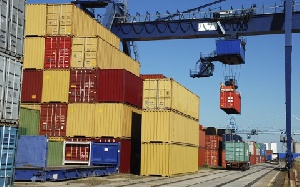 According to CETSED, the GPHA-Amaris terminal deal is an attempt to create a near monopoly
According to CETSED, the GPHA-Amaris terminal deal is an attempt to create a near monopoly
The Centre for Transport Security Dialogue (CETSED), a transport sector advocacy institute, is calling on government to cancel a deal between the Ghana Ports and Harbours Authority (GPHA) and Amaris Terminal Limited.
According to CETSED, the deal makes Amaris Terminal Limited “the sole authorised service provider for the scanning and pre-examination of export consignments apart from Export Exempted Commodities (EEC) at the Tema Port”.
This was contained in a press release on Tuesday, April 25, in which CETSED stated among other things that the GPHA-Amaris terminal deal is an attempt to create a near monopoly, make the other terminals loose market, create unemployment and take competition out of export terminal operations at the port of Tema.
“The partnership between GPHA and one out of the many export container terminals is grossly unfair,” the statement added.
CETSED explained that a section of a letter from GPHA dated 11th August 2016 with reference number DC/HQ/C.3/V.3/121, signed by the immediate-past Director-General of GPHA, Richard Anamoo, and copied to the Ship-Owners and Agents Association of Ghana (SOAAG), the Ghana Institute of Freight Forwarders (GIFF), the sector commander of the Customs Division of the Ghana Revenue Authority, and the Managing Director of Amaris Terminal informing key terminal operators on the new directive, stated “in compliance with the requirement of national security for due diligence to be conducted on all export containers prior to shipment, all loaded export containers, other than EEC, intended for shipment at Tema Port (MPS/or Terminal One) shall first be scanned or pre-examined, as may be directed by the Ghana Customs, at the Amaris Terminals before delivery to any of the port terminals.”
CETSED said by this arrangement, the exporter will first have to scan and weigh his/her consignment at Amaris Terminal before moving the container to other port terminals – where applicable handling charges will still apply.
CETSED is questioning why the ports regulator, GPHA, which is supposed to supervise the export trade activities, has partnered an export consolidator at the expense of other firms engaged in similar business.
“How can a regulator of a specific organisation be a key partner to a company that is into the very industry it is regulating?” CETSED queried.
For them, the GPHA-Amaris Terminal deal does not provide a level playing ground for all export terminal operators within the port community to invest in upgrading their facilities to meet the required standards, which will create competition amongst the terminals to improve efficiency.
CETSED is, therefore, recommending that the GPHA and the Amaris Terminal arrangement or partnership be abrogated.
Secondly, they want the GPHA to task terminals to make provision for customs and national security in terms of office facilities and other logistics.
In addition, it wishes that advocacy institute GPHA contract scanning companies to provide scanning and weighing machines for all terminals.
Lastly, they believe minimum standards for export terminals will encourage healthy competition which will ensure efficiency.